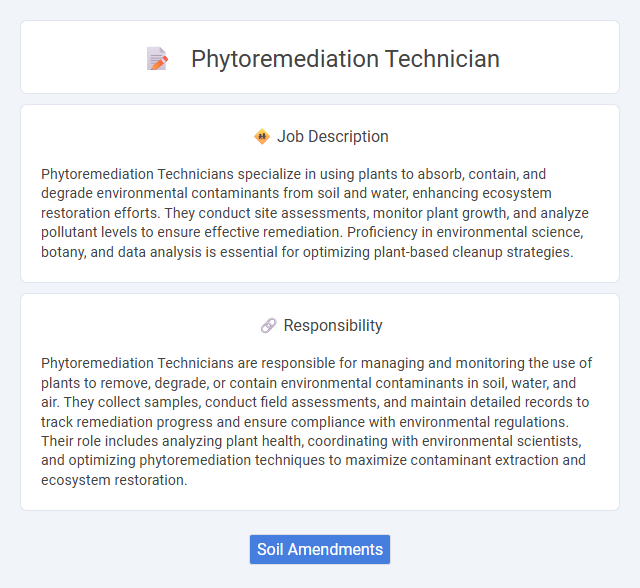
Phytoremediation Technicians specialize in using plants to absorb, contain, and degrade environmental contaminants from soil and water, enhancing ecosystem restoration efforts. They conduct site assessments, monitor plant growth, and analyze pollutant levels to ensure effective remediation. Proficiency in environmental science, botany, and data analysis is essential for optimizing plant-based cleanup strategies.
Individuals who are physically fit and comfortable working outdoors in various weather conditions are more likely to excel as Phytoremediation Technicians. Those with an interest in environmental science and a willingness to perform repetitive tasks may find this role suitable. Candidates who prefer routine fieldwork and have patience for long-term projects probably will thrive in this position.
Qualification
Phytoremediation Technicians require a background in environmental science, biology, or a related field, typically holding an associate or bachelor's degree. Proficiency in plant science, soil chemistry, and contamination assessment is essential for executing effective remediation strategies. Practical experience with field sampling, laboratory analysis, and data interpretation enhances job performance and compliance with environmental regulations.
Responsibility
Phytoremediation Technicians are responsible for managing and monitoring the use of plants to remove, degrade, or contain environmental contaminants in soil, water, and air. They collect samples, conduct field assessments, and maintain detailed records to track remediation progress and ensure compliance with environmental regulations. Their role includes analyzing plant health, coordinating with environmental scientists, and optimizing phytoremediation techniques to maximize contaminant extraction and ecosystem restoration.
Benefit
Phytoremediation Technicians likely contribute to environmental health by using plants to clean contaminated soil and water, which could reduce reliance on chemical treatments and lower remediation costs. This role may provide opportunities for hands-on work in ecological restoration, potentially leading to job growth in the green technology sector. Benefits might include gaining specialized skills in environmental science and contributing to sustainable pollution management efforts.
Challenge
Phytoremediation Technician roles likely involve the challenge of managing diverse environmental contaminants through plant-based solutions, requiring precise monitoring and adaptation to varying soil and pollutant conditions. The probability exists that technicians must troubleshoot unexpected plant stress or limited contaminant uptake efficiency, demanding specialized knowledge and problem-solving skills. Overcoming these obstacles may be critical to successfully restoring contaminated sites while maintaining project timelines and regulatory compliance.
Career Advancement
Phytoremediation Technicians specialize in using plants to remove, degrade, or stabilize environmental contaminants, providing a critical role in ecological restoration projects. Career advancement opportunities include progressing to Environmental Scientist, Project Manager, or Restoration Specialist roles, often requiring further education in environmental science or biotechnology. Developing expertise in advanced remediation technologies and obtaining certifications can accelerate professional growth in this evolving green technology sector.
Key Terms
Soil Amendments
Phytoremediation Technicians specialize in enhancing soil health through the strategic application of soil amendments such as biochar, compost, and gypsum to support plant-assisted remediation. Their expertise in selecting and applying these amendments optimizes the bioavailability of contaminants, improving the efficiency of pollutant uptake by plants. Mastery of soil chemistry and amendment interactions is crucial for achieving sustainable remediation outcomes in contaminated sites.
 kuljobs.com
kuljobs.com